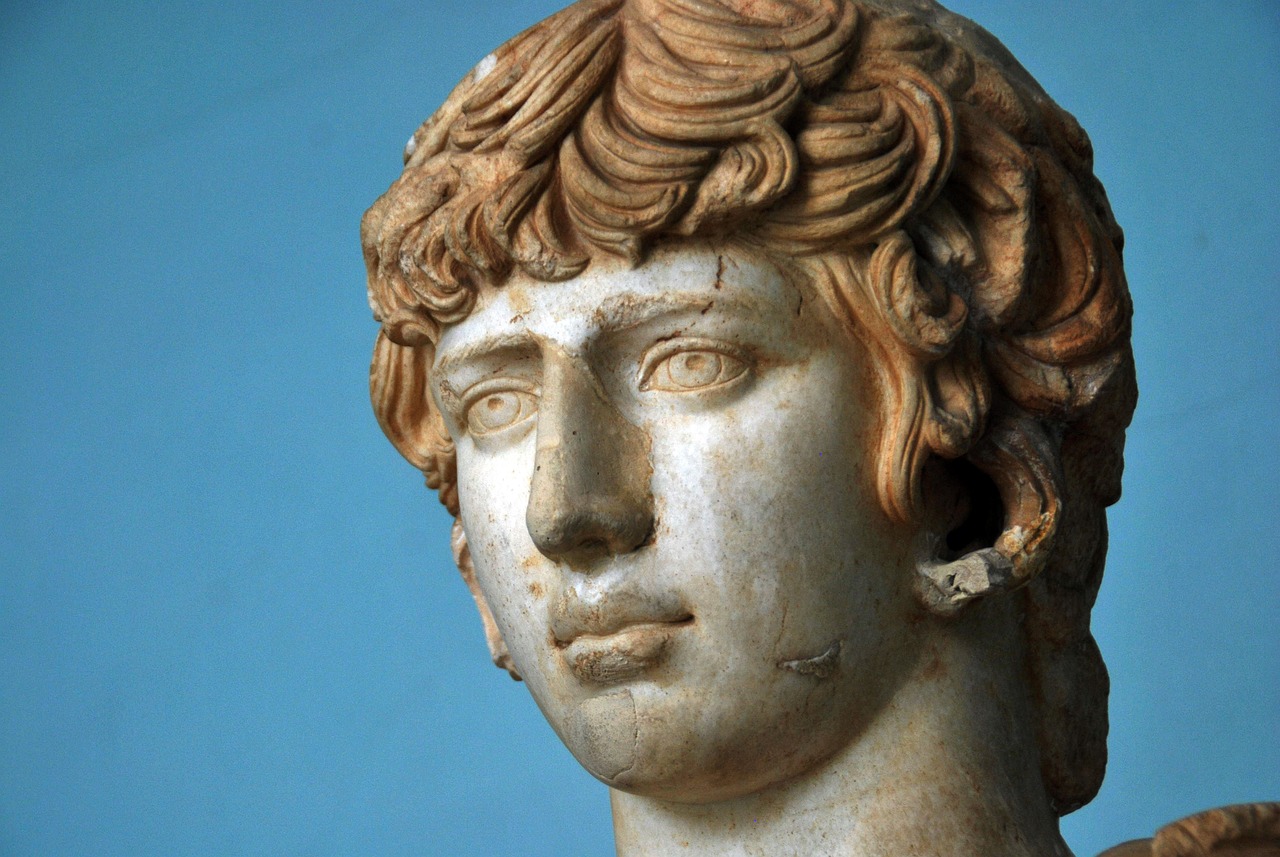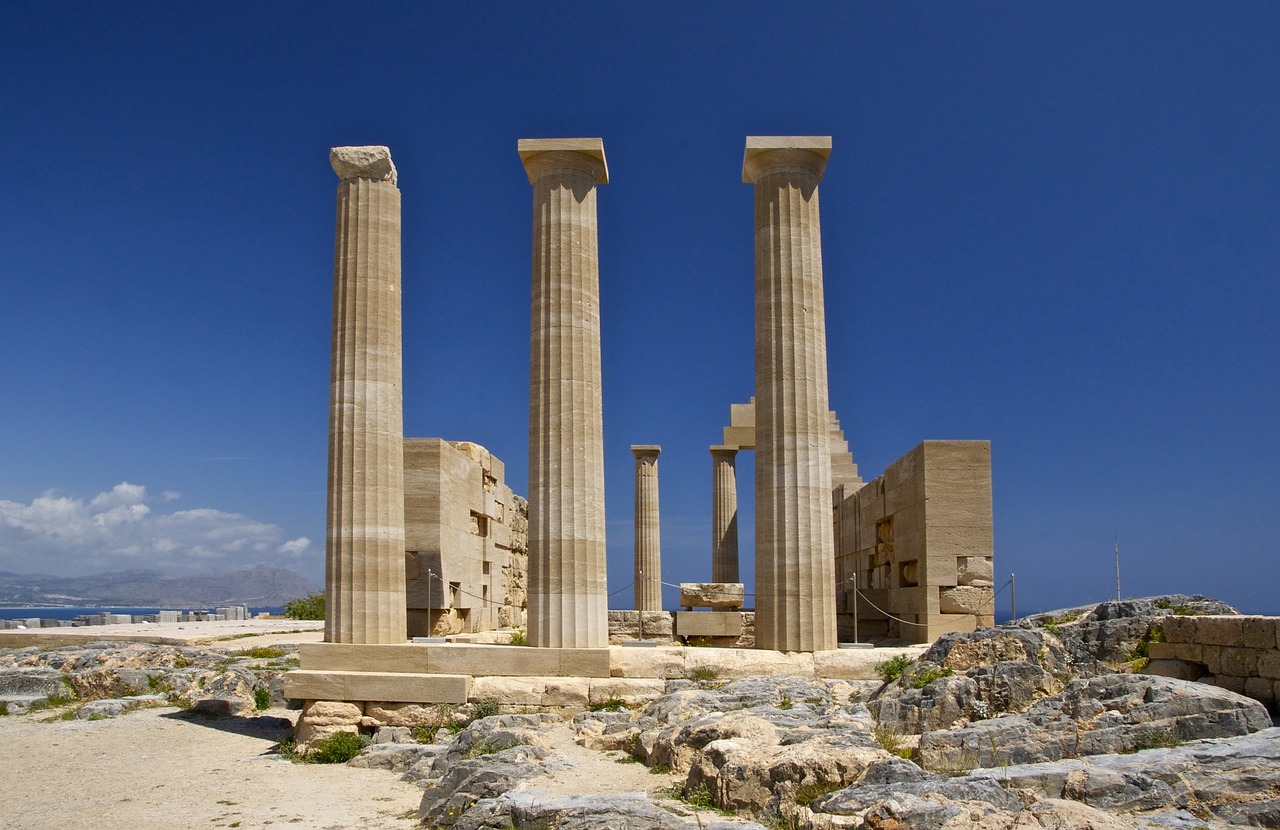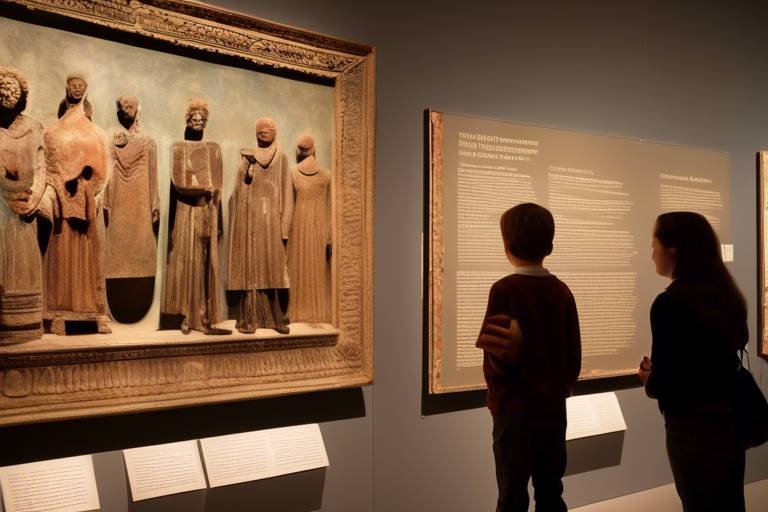The Legacy of Ancient Greece in Modern Thought
Ancient Greece, often hailed as the cradle of Western civilization, holds a profound and enduring influence on modern thought. From philosophy to art, democracy to science, the legacy of ancient Greek culture resonates in various facets of contemporary society, shaping our perspectives, values, and institutions.
At the heart of this legacy lies Greek philosophy, a realm where luminaries like Socrates, Plato, and Aristotle laid the foundation for critical thinking and intellectual inquiry. Their timeless works continue to echo through the corridors of academia, guiding our understanding of ethics, logic, and metaphysics.
Delving into the realm of governance, ancient Greek democracy emerges as a pioneering force that reverberates in today's political landscape. The democratic ideals birthed in Athens centuries ago still inform modern systems of governance, emphasizing the importance of civic participation and collective decision-making.
Turning our gaze to the realm of art and architecture, the grandeur of Greek creativity unfolds before us. The majestic Parthenon stands as a testament to the architectural brilliance of ancient Greece, while sculptures like the Venus de Milo inspire contemporary aesthetics and design principles.
Furthermore, the tradition of the Olympic Games, rooted in ancient Greek athletic competitions, has transformed into a global phenomenon that unites nations in friendly competition. The spirit of sportsmanship and unity fostered by the Greeks continues to thrive in the modern Olympic movement.
Exploring the realms of theater and literature, we encounter the profound impact of Greek tragedies, comedies, and epic poetry on storytelling and dramatic arts. The enduring themes of love, loss, and heroism woven into these ancient narratives resonate with audiences to this day, underscoring the timeless power of storytelling.
In the realm of mathematics and science, the contributions of ancient Greek scholars reverberate through the corridors of modern academia. Pioneers like Pythagoras and Euclid laid the groundwork for contemporary scientific thought, shaping our understanding of mathematics, astronomy, and the natural world.
Harmony, both musical and philosophical, emerges as a central tenet of Greek culture, reflecting a deep reverence for balance and beauty. The melodic strains of Greek music echo through the ages, intertwining with philosophical ideas of harmony and proportion that continue to inspire artistic and intellectual pursuits.
Lastly, the legacy of ancient Greece extends to education and academia, where the Greek educational system and philosophical schools continue to influence pedagogy and intellectual discourse. The pursuit of knowledge, critical inquiry, and the cultivation of wisdom remain enduring legacies of Greek thought in modern educational institutions.

Greek Philosophy's Impact
When delving into the profound impact of Greek philosophy on modern thought, one cannot overlook the monumental contributions of legendary thinkers like Socrates, Plato, and Aristotle. These philosophical giants laid the groundwork for contemporary ethics, logic, and metaphysics, shaping the very foundation of our intellectual discourse and moral reasoning.

Ancient Greek Democracy
Exploring the enduring influence of ancient Greek philosophy, democracy, art, and architecture on contemporary society, politics, education, and culture.
The concept of democracy finds its roots in ancient Greece, particularly in the city-state of Athens. This innovative system of governance, where citizens had a direct say in decision-making, laid the foundation for modern democratic principles. The Athenian democracy, although limited to male citizens, set a precedent for civic engagement and political participation that continues to influence democratic societies worldwide.

Greek Art and Architecture
Exploring the enduring influence of ancient Greek philosophy, democracy, art, and architecture on contemporary society, politics, education, and culture.
The artistic and architectural marvels of ancient Greece continue to captivate and inspire the world with their timeless beauty and profound significance. From the majestic columns of the Parthenon to the intricate sculptures depicting mythological tales, Greek art and architecture stand as a testament to the creativity and ingenuity of the ancient Greeks.
The Greeks perfected the art of sculpting human forms with astonishing realism and attention to detail, setting a standard that has influenced artists throughout the ages. The iconic statues such as the Venus de Milo and the Discobolus showcase the Greeks' mastery in capturing the essence of beauty and movement in stone.
Moreover, Greek architecture, characterized by its harmony, proportion, and elegance, has left an indelible mark on modern design principles. The Doric, Ionic, and Corinthian orders, developed by the Greeks, continue to be revered and replicated in architectural styles around the world.
One cannot overlook the impact of Greek architecture on civic buildings, with their grandeur and symmetry reflecting the ideals of democracy and civic pride. The Acropolis of Athens, with its stunning temples and monuments, remains a symbol of the cultural and architectural legacy of ancient Greece.
By studying Greek art and architecture, we gain insight into the values and beliefs of a civilization that valued beauty, balance, and harmony in all aspects of life. The legacy of Greek art and architecture serves as a timeless source of inspiration for artists, architects, and admirers of beauty across the globe.

Olympic Games Tradition
Exploring the enduring influence of ancient Greek philosophy, democracy, art, and architecture on contemporary society, politics, education, and culture.
Examining how the works of philosophers like Socrates, Plato, and Aristotle continue to shape modern ethics, logic, and metaphysics.
Discussing the origins of democracy in Athens and its relevance to contemporary political systems and civic engagement.
Exploring how Greek artistic achievements, such as the Parthenon and sculptures, inspire modern aesthetics and design principles.
Tracing the roots of the Olympic Games in ancient Greece and their evolution into a global sporting event. The Olympics, originating in Olympia, were a celebration of physical prowess and unity among city-states. Athletes from different regions would gather to compete in various sports, promoting peace and friendly competition. Today, the Olympic Games continue this tradition on a global scale, bringing together nations in a spirit of sportsmanship and camaraderie.
Analyzing the impact of Greek tragedies, comedies, and epic poetry on modern storytelling and dramatic arts.
Highlighting the foundational role of ancient Greek mathematicians and scientists in shaping contemporary scientific thought and methodology.
Exploring the concept of harmony in Greek music and its connection to philosophical ideas of balance and beauty in modern contexts.
Examining how the Greek educational system and philosophical schools influence modern pedagogy, academia, and intellectual discourse.

Theater and Literature Influence
Theater and Literature have always held a significant influence on modern storytelling and dramatic arts, owing much of their legacy to ancient Greek origins. The dramatic works of playwrights like Sophocles, Euripides, and Aeschylus continue to captivate audiences with their timeless themes of tragedy, fate, and human nature. These ancient Greek tragedies serve as the foundation for many literary and theatrical conventions still prevalent today, showcasing the enduring power of storytelling to evoke emotions and provoke thought.
Complementing the tragedies are the comedic works of playwright Aristophanes, whose satirical humor and social commentary provide a window into the everyday life and politics of ancient Greece. The comedic elements present in these ancient Greek plays have influenced modern comedy and satire, demonstrating the lasting impact of humor as a tool for social critique and entertainment.
Furthermore, the epic poetry of Homer, particularly the Iliad and the Odyssey, stands as a testament to the enduring power of storytelling and the human experience. These epic narratives have inspired countless works of literature and continue to shape the way we understand heroism, adventure, and the complexities of the human condition.
In the realm of theater, the structure and conventions established by ancient Greek playwrights have become fundamental to the art form. Elements such as the three-act structure, character development, and dramatic tension can be traced back to the innovations of Greek theater, underscoring the enduring influence of ancient Greek drama on modern theatrical practices.

Mathematics and Science Contributions
Mathematics and science stand as pillars of ancient Greek intellectual achievement, laying the groundwork for modern scientific inquiry and mathematical principles. The legacy of Greek mathematicians such as Euclid, Pythagoras, and Archimedes reverberates through time, influencing fields ranging from geometry to physics. Euclid's "Elements" remains a foundational text in geometry, outlining the principles of deductive reasoning that underpin mathematical proofs to this day. Pythagoras's theorem, a fundamental concept in geometry, illustrates the enduring impact of Greek mathematical discoveries on contemporary education and problem-solving methodologies.
Moreover, the contributions of ancient Greek scientists like Aristotle and Hippocrates have left an indelible mark on the development of scientific thinking. Aristotle's empirical approach to natural philosophy laid the groundwork for the scientific method, emphasizing observation and classification of natural phenomena. His work in biology and zoology set a precedent for scientific inquiry that continues to shape modern scientific research methodologies. Similarly, Hippocrates, known as the father of Western medicine, introduced ethical standards and observational practices that form the basis of modern medical ethics and diagnostic procedures.

Musical and Philosophical Harmony
When delving into the realm of ancient Greek culture, one cannot overlook the profound connection between music and philosophy. The Greeks believed in the intrinsic harmony that existed between these two seemingly disparate disciplines. Music was not merely a form of entertainment but a philosophical pursuit that aimed to reflect the balance and beauty found in the natural world.
Through the lens of Greek philosophy, music was seen as a manifestation of cosmic order and mathematical precision. The concept of harmony in music was intricately linked to the philosophical ideas of balance and proportion. Just as in music, where different notes come together to create a harmonious melody, in philosophy, various elements harmonize to form a coherent and balanced worldview.
This harmonious approach to music and philosophy permeated Greek society, influencing not only artistic expressions but also intellectual discourse. The idea of seeking balance and beauty in all aspects of life, whether in music composition or philosophical contemplation, underscored the Greek belief in the interconnectedness of the arts and sciences.
Moreover, the Greek emphasis on musical and philosophical harmony laid the foundation for the development of Western thought. The enduring legacy of Greek music and philosophy can be seen in modern theories of aesthetics, ethics, and metaphysics, where the pursuit of harmony continues to be a central theme.

Legacy in Education and Academia
Education and academia have been profoundly influenced by the legacy of ancient Greece, shaping the very foundations of modern learning and intellectual discourse. The Greek educational system, dating back to philosophers like Plato and Aristotle, emphasized critical thinking, debate, and the pursuit of knowledge. These principles continue to resonate in contemporary pedagogy, where educators strive to foster analytical skills and independent thought among students.
Ancient Greek philosophical schools, such as the Academy and the Lyceum, laid the groundwork for the development of diverse academic disciplines. The emphasis on interdisciplinary learning and the exploration of fundamental questions about existence, ethics, and the natural world set a precedent for the holistic approach to education seen in universities today. The legacy of these schools can be observed in the structure of modern academia, where departments and faculties specialize in various fields of study.
Furthermore, the concept of mentorship and the teacher-student relationship, prevalent in ancient Greek educational practices, continues to be a cornerstone of effective teaching. The idea of guiding and inspiring students to reach their full potential, as exemplified by legendary teachers like Socrates, has endured through the centuries and remains a central tenet of quality education.
Philosophical ideas from ancient Greece, such as the pursuit of truth, the importance of ethics, and the value of knowledge for its own sake, continue to inform academic research and intellectual inquiry. The Socratic method of questioning assumptions and seeking deeper understanding has become a hallmark of scholarly discourse, encouraging critical thinking and rigorous analysis in academic pursuits.
In conclusion, the legacy of ancient Greece in education and academia is profound and far-reaching, influencing not only the structure of learning institutions but also the values and principles that underpin scholarly endeavors. By recognizing and embracing this rich heritage, educators and scholars can continue to draw inspiration from the wisdom of the past to shape the future of learning and intellectual exploration.
Frequently Asked Questions
- What is the significance of Greek philosophy in modern thought?
Greek philosophy has had a profound impact on modern thought by laying the foundation for ethics, logic, and metaphysics. The works of philosophers like Socrates, Plato, and Aristotle continue to influence how we perceive the world and ourselves.
- How did ancient Greek democracy shape contemporary political systems?
Ancient Greek democracy, originating in Athens, set the stage for modern democratic principles and civic engagement. Its emphasis on citizen participation and rule of law continues to shape political systems around the world.
- What is the legacy of Greek art and architecture in modern aesthetics?
Greek artistic achievements, such as the Parthenon and sculptures, serve as timeless inspirations for modern aesthetics and design principles. Their beauty and symmetry continue to influence architecture and artistry today.
- How have the Olympic Games evolved from their ancient Greek roots?
The Olympic Games, rooted in ancient Greece, have evolved into a global sporting event that promotes international unity and athletic excellence. The spirit of competition and camaraderie from the ancient games still resonates in the modern Olympics.
- What role did Greek theater and literature play in shaping modern storytelling?
Greek tragedies, comedies, and epic poetry have left a lasting impact on modern storytelling and dramatic arts. Themes of heroism, fate, and human nature explored in ancient Greek works continue to resonate in literature and theater today.
- How did ancient Greek mathematicians and scientists contribute to contemporary scientific thought?
Ancient Greek mathematicians and scientists laid the groundwork for modern scientific methodology and thought. Concepts such as geometry, astronomy, and logic developed by figures like Euclid and Pythagoras continue to influence scientific inquiry today.
- What is the connection between Greek music and philosophical ideas in modern contexts?
The concept of harmony in Greek music reflects broader philosophical ideas of balance and beauty. This harmony extends beyond musical notes to encompass a sense of equilibrium and aesthetic pleasure that resonates in various aspects of modern life.
- How do Greek educational systems and philosophical schools impact modern academia?
The Greek educational system, including philosophical schools like the Academy and Lyceum, laid the foundation for modern pedagogy and intellectual discourse. The emphasis on critical thinking, debate, and pursuit of knowledge continues to shape academic institutions and learning methodologies today.



















